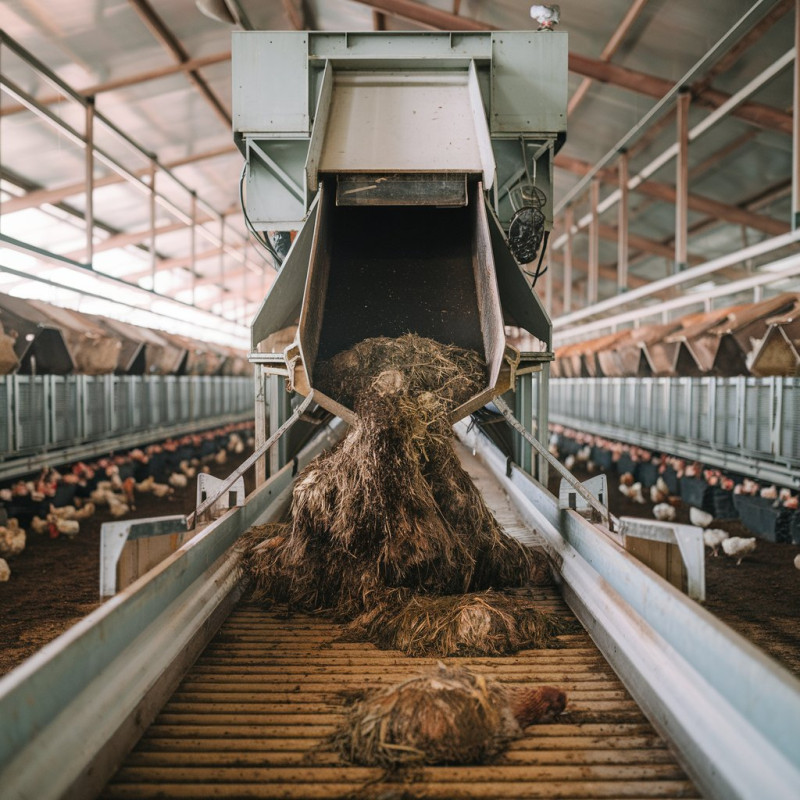How to Handle Poultry Waste Effectively for a Cleaner Farm
Date : 2024-12-19
Introduction: Proper poultry waste management is essential for maintaining a cleaner farm and promoting sustainable agriculture. Poultry waste, which includes manure, bedding, feathers, and other by-products, can pose significant environmental and health risks if not handled correctly. Effective waste management helps in reducing odors, controlling pests, and preventing contamination of soil and water. In this blog, we will explore the best practices for managing poultry waste efficiently, ensuring a cleaner, healthier, and more productive farm.
1. Understand Poultry Waste Types
Poultry waste is primarily composed of two categories:
Manure: A combination of chicken droppings and bedding material like straw, sawdust, or wood shavings.
Feathers and Other By-Products: Feathers, carcasses (from culling), and waste food.
Each type of poultry waste requires different handling methods, which is why it's important to identify them and develop a targeted approach for each.
2. Composting Poultry Waste
One of the most effective and environmentally friendly ways to handle poultry waste is through composting. Composting breaks down the waste into organic matter, enriching the soil and reducing its environmental impact. Here’s how you can compost poultry waste effectively:
Collect Poultry Manure: Ensure that the waste is collected regularly to prevent pile-up and avoid breeding pests.
Proper Carbon-to-Nitrogen Ratio: Mix manure with carbon-rich materials like straw or leaves. The right ratio (approximately 25-30 parts carbon to 1 part nitrogen) ensures proper composting.
Aeration: Turn the compost pile regularly to provide oxygen, preventing anaerobic conditions that may lead to odor problems.
Moisture Control: Maintain the right moisture level in the compost pile. Too much moisture can lead to a slimy, smelly pile, while too little moisture can slow down the composting process.
Temperature Management: Keep the compost pile warm, ideally between 130°F and 160°F (54°C to 71°C), to encourage microbial activity and reduce pathogens.
Once fully composted, the material can be used to improve soil health on your farm or sold as organic fertilizer.
3. Implementing Manure Management Systems
For farms with large-scale poultry operations, a manure management system is crucial to handle the large volume of waste produced. These systems can range from simple composting methods to advanced technologies such as anaerobic digesters. Here are some key strategies:
Deep Litter Systems: In this system, poultry waste is left to accumulate in the bedding for extended periods, allowing it to break down naturally. This reduces labor and waste handling time.
Manure Pit Systems: Manure is collected in underground pits, reducing exposure to the air and preventing odors.
Mechanical Waste Removal: Use mechanical systems to remove waste daily from poultry houses, minimizing the spread of disease and reducing waste buildup.
By implementing a suitable system, you can keep the farm clean and reduce the environmental footprint of poultry farming.
4. Utilize Poultry Waste for Biogas Production
In addition to composting, poultry waste can be used to generate biogas. Anaerobic digestion of poultry manure produces methane, which can be captured and used as an energy source. This process not only reduces waste but also provides a renewable energy option for farms. Some of the benefits of biogas production include:
Renewable Energy: Poultry waste is a readily available resource that can help generate power for your farm operations.
Reduced Methane Emissions: Capturing methane reduces its release into the atmosphere, thus lowering your farm’s greenhouse gas emissions.
Organic Fertilizer: The by-product of anaerobic digestion, known as digestate, is a nutrient-rich substance that can be used as organic fertilizer.
5. Odor Control Measures
A common issue with poultry waste is the odor, which can attract pests and affect the quality of life for farmers and surrounding communities. Implementing proper odor control methods can improve air quality on your farm:
Regular Cleaning: Clean poultry houses regularly to remove accumulated waste and reduce odors.
Good Ventilation: Ensure adequate airflow in poultry houses to prevent the build-up of moisture and odors.
Use of Absorbents: Materials like lime, zeolite, or charcoal can be spread in poultry houses to absorb moisture and reduce smells.
Biofilters and Air Scrubbers: For larger farms, installing biofilters and air scrubbers can help filter out odorous gases from poultry barns.
6. Prevent Water Contamination
Improperly managed poultry waste can lead to water contamination, particularly in areas where the waste runoff enters local streams and rivers. To prevent this, consider the following:
Manure Storage: Store poultry waste in secure, covered containers to prevent runoff during heavy rain.
Use of Buffer Zones: Establish vegetative buffer zones around poultry houses and waste storage areas to absorb runoff and filter pollutants.
Proper Waste Disposal: Dispose of waste in designated areas, ensuring it does not come into contact with water sources.
7. Educate Your Farm Workers
Ensuring that all farm workers are well-trained in proper poultry waste management practices is key to maintaining a cleaner farm. Regular training on composting, waste removal systems, and biosecurity measures can help prevent mishandling and minimize environmental risks.
Conclusion:
Efficient poultry waste management is crucial not only for maintaining a cleaner farm but also for ensuring long-term sustainability and profitability in poultry farming. By composting, using biogas production, and implementing robust manure management systems, you can reduce pollution, enhance soil health, and create a safer environment for your poultry. Don't forget the importance of education and regular maintenance to ensure that waste is managed effectively.
By following these strategies, you’ll be able to handle poultry waste effectively and achieve a cleaner, healthier farm. Take action today to build a sustainable future for your poultry operation!